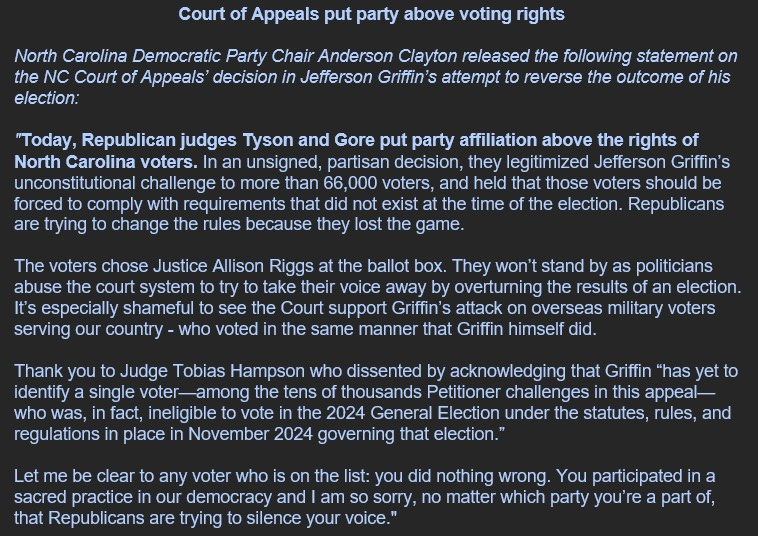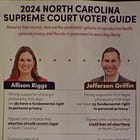NC Court of Appeals issues ruling in NC Supreme Court race
The ruling sided with Republican candidate Jefferson Griffin 2-1
Last night the NC Court of Appeals panel delivered its ruling in the elections protest appeal brought by Republican candidate Jefferson Griffin, who currently sits on that court.
Oral arguments were heard by the panel on March 21 after a request for a full en banc hearing from Democratic candidate and current NC Supreme Court Associate Justice Allison Riggs was denied.
The ruling was 2-1, with Republican Judges John Tyson and Fred Gore in the majority and Democratic Judge Toby Hampson dissenting.
“Free elections under … the North Carolina Constitution include the right to an accurate counting of votes,” the majority wrote. “Griffin has a legal right to inquire into this outcome through the statutorily-enacted and postelection procedures available to him.”
The ruling found:
The NC State Board of Election’s (NCSBE) erred in its dismissal of Griffin’s protest over “lack of adequate notice.”
The lower court’s decision on denying the incomplete voter registration protest was reversed; effective at 5 pm on April 7, the NCSBE is ordered to allow voters to cure their registrations within 15 business days of being contacted. Any uncured ballots will be tossed. The same reversal and order to the NCSBE was applied to the lack of photo ID by overseas and military voters.
Griffin’s challenge to “Never Residents” was found valid; the panel reversed the lower court ruling and said those votes have to be removed from the vote count.
Griffin has not yet issued a formal statement.
Riggs issued a statement that she will be appealing the ruling to the NC Supreme Court.
“We will be promptly appealing this deeply misinformed decision that threatens to disenfranchise more than 65,000 lawful voters and sets a dangerous precedent, allowing disappointed politicians to thwart the will of the people,” Riggs said. “North Carolinians elected me to keep my seat and I swore an oath to the constitution and the rule of law - so I will continue to stand up for the rights of voters in this state and stand in the way of those who would take power from the people.”
Riggs also repeated her statement in a fundraising email sent Friday evening:
The Riggs campaign is using ActBlue for fundraising. ActBlue is the subject of a new House Judiciary report on ActBlue found the fundraising platform had allowed fraudulent and foreign donations during the 2024 election cycle.
How we got here
On election night, Griffin was ahead of Riggs by over 10,000 votes. Over the next day or two, Riggs somehow overcame that gap, mainly through provisional ballots.
Riggs’ total ended up being 2,770,412 votes (50.01%) and Griffin landed at 2,769,678 votes (49.99%). Doing the math, Riggs came in 734 votes ahead of Griffin.
Griffin’s case outlined three specific categories of election protests, which were dismissed by the NCSBE In December 2024 and subsequently affirmed by the Wake County Superior Court. Griffin appealed, and the Court of Appeals reviewed the Superior Court’s affirmation of the Board’s dismissals.
Griffin’s protests were over incomplete voter registrations that the NCSBE failed to cure ahead of the election, Lack of voter ID for overseas and military ballots, and “never residents.”
“Never residents” are individuals who were identified as casting ballots from overseas voters that were born outside the U.S., have never actually resided in North Carolina, and that have no intent to reside here, but whose parents were North Carolina voters before leaving the U.S.
Here are those challenges with a breakdown of the number of votes/voters being challenged:
1. Constitutional challenge to overseas voters who never lived in NC (267 votes)
2. Photo ID requirements for overseas/military voters (5,509 votes)
3. Voter registration information requirements (60,273 voters)
More To The Story
Breaking down the ruling
The Court of Appeals panel addressed two primary issues raised by Griffin regarding the NCSBE’s dismissal of his protests; Adequate Notice and Probable cause of elections law violations.
For Adequate Notice, The panel looked at whether or not Griffin provided sufficient notice to voters whose ballots he challenged per election protest procedures. The Democratically controlled NCSBE said he his postcards with a web address and QR code were insufficient.
The court found the NCSBE’s adequate notice requirement conflicted with N.C. Gen. Stat. § 163-182.10(b). That statute puts the duty to notify on county boards and not those filing a protest. The statute only requires notice before an evidentiary hearing, not at the preliminary stage, which the majority on the panel said voids the NCSBE’s form and that they had exceeded their statutory authority.
The majority noted that even if a notice was required, Griffin’s postcard method was the same kind of notice the NCSBE has used itself, and referred to the QR codes in the NCSBE’s Judicial Voter Guide.
On, probable cause of election law violations, they determined if Griffin had established probable cause violations occurred in three previously mentioned categories of challenged ballots: Voter registration, lack of photo ID for overseas/military ballots, and Never Residents.
Here, the panel dinged the NCSBE for inaction.
Since 2004, the North Carolina Constitution and relevant statutes have required legal registration of voters, including identification details that Griffin’s protest has shown as missing in over 60,000 cases.
Through lawsuits brought prior to Griffin’s protest, is was shown the NCSBE failed to enforce this requirement until 2023 and failed to notify voters of deficiencies and allow them to cure their registrations.
The majority on the panel said such votes could be disallowed under precedent (James v. Bartlett), the deficiency is curable, and fairness warranted giving voters a chance to correct it. The ruling directs the NCSBE to contact the voters in question and gives those voters 15 business days to fix their registrations to comply with state law.
For Never Residents, the panel was clear: these votes are to be removed from the count.
The majority cited the North Carolina Constitution (Art. VI, § 2) and statutes (N.C. Gen. Stat. § 163-55(a)) limit voting to residents, defined as those living in the state or intending to return (N.C. Gen. Stat. § 163-57).
The ruling also cited two other cases (Hannon v. Grizzard, Thayer v. Thayer), which underscore residency equates to domicile; it cannot be inherited by emancipated adults who never lived in North Carolina and have no intention of coming back.
Hampson lengthy dissent says he believes the majority’s decision lacked legal grounding and threatened fundamental voting rights. He also thinks the election protests, which are legal and often part of the process, disrupted a fair election after the fact and Hampson claims there was “insufficient” justification from Griffin. Hampson, overall, wished to to affirm the NCSBE’s protest dismissals and the subsequent ruling in Wake County Superior Court.
Hampson's dissent also rejects the majority’s 15-day “cure period” as an impractical and "invented" solution that puts the burden onto voters, especially overseas and military voters.
Hampson also didn't like Griffin's use of bulk-mail postcards with QR codes as insufficient notice to challenged voters and expressed he doesn't think they meet constitutional due process standards and the postcards "undermined" the legitimacy of Griffin's protests. This is the same argument the NCSBE made about QR codes, which the NCSBE itself has used and which are used by most candidates these days.
Statements issued
“The court’s decision is not yet in effect and is likely to be appealed,” the NCSBE said in a statement. “If the court’s decision does go into effect, the State Board of Elections will provide instructions to affected voters on how to comply with the court’s decision.”
The NCSBE’s statement also included encouraging voters who are unsure if their voter registration meets legal standards to submit an updated form.
Both the Republican and Democratic Parties in the state dropped statements on the ruling.
Related Reading








